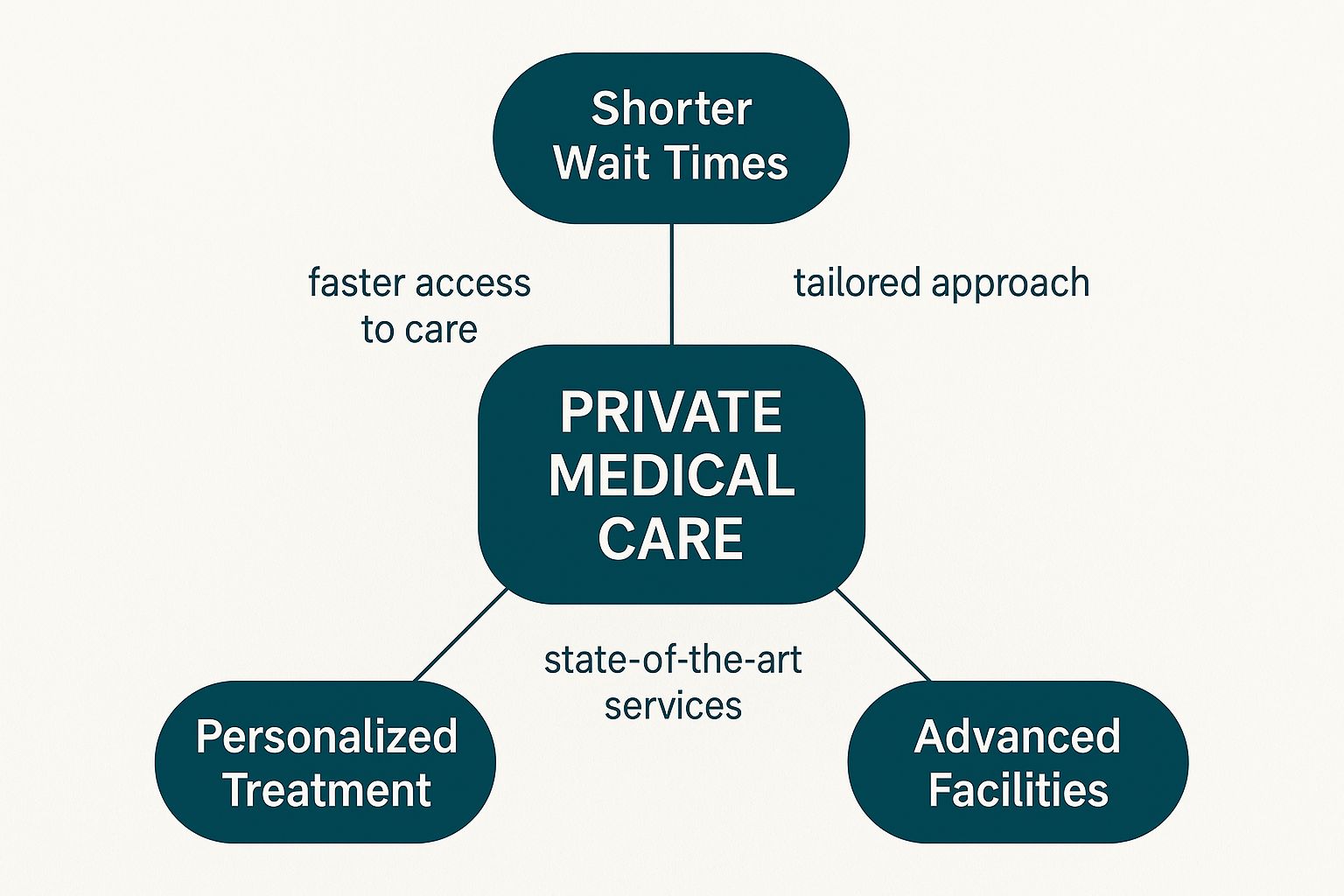.webp)
Ever wondered what private medical care is all about? In simple terms, it's a healthcare system that runs separately from the NHS, paid for either directly by patients or through private insurance. Think of it as a 'fast-pass' for your health—it can give you quicker access to specialists and a lot more say over when and where you get treated.
A lot of people think private care is an either/or replacement for the NHS, but it’s more useful to see it as a complementary service. It exists side-by-side with the NHS, offering a different route for things like non-emergency consultations, diagnostic tests, and planned treatments. The whole point is to give you choice and speed, helping you sidestep long waiting lists for certain procedures.
So, why do people go private? It usually boils down to a few key reasons. For some, the biggest draw is cutting down the long wait for a specialist appointment or an operation. For others, it’s about having the flexibility to book treatments around their work and family life, or simply wanting more one-on-one time and personalised attention from their consultant.
The way we think about healthcare in the UK is definitely shifting. Recent surveys show that a staggering 71% of UK residents would now think about using private healthcare if they needed it—a huge jump from just a few years ago. This isn't just a trend among the young, either. It’s consistent across the board, with 63% of people over 65 also open to the idea.
This growing interest is changing how people approach their health. By getting to grips with all the medical services available, you can make smarter choices that actually fit your life. The main attractions really are the speed, the personal touch, and the access to modern facilities.
The infographic below breaks down these core benefits.

As you can see, the real value of private care is in delivering efficient, patient-focused services in a comfortable, modern setting.
At its heart, private medical care is about giving you more control over your healthcare journey. It empowers you to choose not just if you get treatment, but also when, where, and with whom.
Ultimately, it’s about having another layer of choice. It’s not here to replace our brilliant NHS, but to offer a parallel path for those who put a premium on speed, comfort, and direct access to specialists.
To make things clearer, let’s quickly compare the two systems.
This table isn't about which is "better"—both systems are vital. It just shows how they offer different experiences to meet different needs.

While the idea of skipping a long queue is often the first thing that comes to mind, the advantages of private medical care run much deeper. It’s about creating a more controlled, comfortable, and personalised healthcare experience—one that puts you firmly in the driver's seat of your own health journey.
This growing appeal is reflected in the numbers. Last year saw a record-breaking 939,000 patient admissions to private hospitals in the UK, a 20% increase compared to pre-pandemic levels. The surge includes a massive 38% rise in people paying for their own care, showing a clear trend of individuals proactively investing in their health.
This shift isn’t just about statistics; it’s about people seeking specific advantages that align with their needs and priorities.
One of the most powerful benefits is getting rapid access to expert medical opinions and crucial diagnostic tests. Instead of waiting weeks or even months for an appointment, you can often see a leading consultant within days.
Imagine you’ve been dealing with persistent knee pain. In the private system, you could book a consultation with an orthopaedic specialist quickly, get an MRI scan shortly after, and have a diagnosis and treatment plan in place within a very short timeframe. This isn't just for convenience; it can lead to faster relief and potentially stop a condition from getting worse.
The core value here is the compression of time. By shortening the gap between identifying a problem and starting treatment, private medical care can significantly improve your quality of life and reduce periods of uncertainty and worry.
This proactive approach is also brilliant for preventative health. By understanding where you stand with a comprehensive check-up, like an essential health assessment, you can spot potential issues early and take control before they become more serious.
Private healthcare puts choice directly into your hands. You aren’t just assigned to the next available doctor; you have the freedom to select a specific consultant based on their expertise, reputation, or recommendations. This means you can find a specialist you genuinely trust and feel comfortable with.
This flexibility extends to scheduling, too. Key benefits include:
This level of control empowers you to build a healthcare experience that is shaped around your life, not the other way around.
The environment where you receive care can have a real impact on your recovery and overall wellbeing. Private hospitals are designed with patient comfort and privacy as a priority. Instead of staying on a busy, open ward, you’ll almost always have your own private room.
This personal space offers a quiet and restful atmosphere, which is ideal for recovery after a procedure. Other comforts often include:
Longer, more detailed consultations are another hallmark of private medical care. Having more time with your consultant allows for in-depth discussions, ensuring all your questions are answered thoroughly. You feel fully informed and involved in every decision about your treatment, helping to build a strong patient-doctor relationship based on trust.

Let's be honest, the financial side of private medical care can feel a bit daunting. But it doesn't have to be confusing. The first step towards making a confident decision about your health is simply understanding how the costs are structured and what you're actually paying for.
Think of it less as a single, intimidating price tag and more as a series of connected costs. Each part of your journey—from that initial chat with a specialist to the final follow-up appointment—has a value attached to it. When you see it broken down, the complete picture becomes much clearer, and you can avoid any unwelcome surprises down the line.
Good private healthcare providers champion this kind of transparency. They should always be able to give you a detailed quote that outlines every expected charge, so you can budget properly and focus on what really matters: your health.
A final bill for any private treatment is usually a sum of several key parts. Getting to grips with these components helps you understand exactly where your money is going and lets you compare different hospitals or clinics fairly.
Here’s what you’ll typically see:
Knowing what these individual parts are empowers you to ask the right questions and fully grasp the investment you're making.
When it comes to paying for a procedure, you’ll generally find two main pricing models. Understanding the difference is vital for choosing the right option for you and your budget.
A fixed-price package is an all-inclusive cost for a specific treatment, like a hip replacement or cataract surgery. It bundles everything—the surgeon, anaesthetist, hospital stay, and standard aftercare—into a single, upfront price. This gives you absolute financial certainty. No hidden extras.
The other option is the 'pay-as-you-go' model, where you pay for each part of your treatment as you go. While this might feel more flexible, it comes with less predictability. An unexpected test or a slightly longer recovery stay in hospital could push the final bill higher.
For many people, fixed-price packages provide invaluable peace of mind. Knowing the total cost from the outset eliminates financial anxiety, allowing you to focus entirely on your recovery.
It’s clear that more and more people in the UK are willing to invest directly in their health. Recent data shows that a remarkable one in seven Britons used private healthcare services in the past year alone.
The median spend per person was around £500 annually, showing a real commitment to getting timely medical care. This trend highlights that for a growing number of people, self-funding treatment is a practical and accessible choice.
To give you a clearer idea of what to expect for different treatments, it's helpful to see a breakdown of typical costs.
The table below shows some estimated price ranges for common procedures if you're funding them yourself. Keep in mind these are just ballpark figures and can vary based on the clinic, location, and your specific needs.
These figures help illustrate the kind of investment involved. For a more detailed look, you can review a full list of prices for various procedures to help you plan. Making an informed financial decision is a crucial part of taking control of your health journey.

Once you’ve decided private medical care is the right path, the next question is always a practical one: "How do I pay for it?" Getting your head around the funding options is just as important as choosing the right consultant or hospital.
Thankfully, there are a few clear ways to cover the costs of private treatment in the UK. The three main routes are paying directly yourself, using private medical insurance, or taking advantage of a scheme offered by your employer. Let's break them down so you can see which one fits your situation best.
This is the most straightforward route, often called self-funding. You simply pay the hospital or clinic directly for any consultations, tests, or procedures you have. The big advantage here is total flexibility and control—you aren't tied to an insurer's list of approved specialists or their specific terms.
Its simplicity is its biggest draw. You can seek treatment whenever you feel you need it, without waiting for pre-authorisation from a third party. This works brilliantly for one-off procedures or specific health worries where you just want to get things sorted quickly.
To make budgeting easier, many private providers now offer fixed-price packages for common operations. This gives you complete transparency, meaning you know the full cost upfront without any nasty surprises down the line. It offers genuine certainty over your financial commitment.
Private medical insurance (PMI) is another very popular option. The model is simple: you pay a monthly or annual premium to an insurer, and they cover the cost of eligible private treatments. Think of it as a safety net, protecting you from large, unexpected medical bills for acute conditions that pop up after your policy starts.
When you're looking at PMI policies, you have to get into the details. Here are a few key terms to look out for:
PMI is really designed to provide peace of mind. Knowing you have a plan in place to handle major medical costs lets you focus on your health, not the bills.
A solid policy will give you access to a wide range of top-tier private hospitals and specialists. Many people find the structure of insurance a reassuring way to plan for their long-term health. If you are looking for more continuous day-to-day care, you might also be interested in learning about the benefits of private GP subscriptions, which can work well alongside a broader insurance plan.
More and more companies are offering private healthcare as part of their employee benefits package. If your employer has a scheme like this, it can be an incredibly cost-effective way to get private medical care, as the company usually pays all or most of the insurance premium for you.
These corporate schemes often come with excellent levels of cover, sometimes even including conditions that might be excluded from individual policies. It's always a good idea to check with your HR department to see what’s on offer.
In many cases, you can also add your partner or family members to the policy for an extra premium, extending the benefits to your loved ones. For many people, this kind of workplace perk is becoming a really important factor when they're considering a new job.
Picking the right hospital, clinic, or specialist is a massive decision on your private healthcare journey. Think of it like bringing a trusted partner onto your health team – you need someone with proven expertise, a solid track record, and a genuine focus on patients. Getting this right isn't just about ticking boxes with credentials; it's about finding a provider who gives you complete confidence and peace of mind.
It takes a bit of homework, but thankfully there are some excellent, independent resources out there to help you. By knowing where to look and what to ask, you can move forward feeling sure you’ve found the best possible care for your specific needs.
Your first port of call should always be the Care Quality Commission (CQC). The CQC is the independent regulator for all health and social care services in England. They inspect hospitals and clinics on the ground, giving them one of four ratings: Outstanding, Good, Requires Improvement, or Inadequate.
These ratings give you an impartial, birds-eye view of a provider's safety, effectiveness, and overall quality of care. A ‘Good’ or ‘Outstanding’ rating is a powerful signal that the facility meets high standards. You can easily search for any private hospital or clinic on the CQC website to see their latest inspection reports in full.
Once you’ve settled on a hospital, the next step is to check out your potential consultant or specialist. The UK has very robust systems for this, so you can easily verify a doctor's qualifications and professional standing.
Here’s where to look:
These checks are simple to do and provide essential reassurance that your chosen specialist is a true expert.
For a much deeper dive, the Private Healthcare Information Network (PHIN) is an invaluable resource. As an independent, government-approved organisation, PHIN collects and publishes performance and fee data from all private hospitals across the UK.
This screenshot from the PHIN website shows just how easy it is to look up specific procedures or hospitals and compare them directly.
The site lets you compare hospitals based on real patient feedback, the number of times they've performed a certain procedure, and other vital quality measures, helping you make a decision based on hard data, not just marketing.
Before you commit to anything, it’s vital to have a clear and open conversation with your provider. Don't be afraid to ask detailed questions until you feel completely comfortable. This is a big decision, and you deserve total clarity.
Here’s a checklist of crucial questions to guide that discussion:
Asking these questions upfront ensures there are no nasty surprises and helps you build a trusting relationship with your healthcare team from day one. Our own guide to the best private hospitals in the UK also offers more insight into what sets a top-tier facility apart.
Choosing a private provider is about more than just medical expertise. It's about finding a facility and a team that aligns with your expectations for communication, comfort, and care, ensuring your entire experience is positive and supportive.
Stepping into the world of private medical care often brings up a few questions. Getting your head around the practical details—like how to get started or how it works alongside the NHS—is the key to feeling confident about your choices.
We've put together some straightforward answers to the questions we hear most often, helping to clear up any confusion so you can decide what's right for you.
This is one of the most common questions, and a really important one. While you can sometimes see a specialist without one if you're paying yourself, getting a referral from your NHS GP is almost always the best way to start.
Think of your GP as the one person who holds the complete story of your health. They have your full medical history and can write a detailed referral letter to a private consultant. This ensures the specialist has all the crucial background from day one, leading to safer and more effective care.
If you’re using private medical insurance, a GP referral is usually a requirement to get your treatment authorised. But even if you’re funding it yourself, involving your GP creates a seamless link between your NHS and private care. It keeps everyone on the same page.
This is a critical point to understand: private hospitals in the UK are not set up for acute emergencies. If you have a suspected heart attack, stroke, major injury, or you’re struggling to breathe, you must call 999 or go straight to an NHS A&E department.
The NHS is the only provider of emergency medical services in the country. Its A&E departments are specifically staffed and equipped to handle life-threatening situations with the speed they demand.
Private medical care is designed for planned, non-emergency consultations, diagnostics, and treatments. It’s a brilliant partner to the NHS, but it doesn’t replace its vital emergency services.
For planned procedures and faster access to specialists for non-urgent problems, private care is an excellent route. For any genuine medical emergency, the NHS is always the right and only choice.
Absolutely. It’s a myth that you have to choose one or the other. In reality, many people mix and match NHS and private care to get the best of both worlds, creating a healthcare plan that’s flexible and works for them.
This can happen in a couple of ways:
The secret to making this work is simple: communication. Make sure your private consultant sends reports and updates to your NHS GP. This keeps your medical record complete and ensures all the doctors involved in your care know exactly what’s going on.
This is where reading the small print really pays off. A private medical insurance (PMI) policy is a fantastic tool, but it isn’t a blank cheque. Every policy has its own specific terms, benefit limits, and—most importantly—exclusions.
Knowing what isn’t covered is just as important as knowing what is. While the details vary, most policies share a few common exclusions you should be aware of.
Here’s what most standard PMI policies typically don’t cover:
Always take the time to read your policy documents from cover to cover. If anything is unclear, call the insurer directly. Getting that clarity upfront means no nasty surprises or unexpected bills down the line.
At The Vesey, we believe in providing exceptional care with complete transparency. Whether you are considering your first private consultation or have detailed questions about a specific procedure, our team is here to guide you every step of the way. Discover our full range of medical services and start your journey to better health today.

